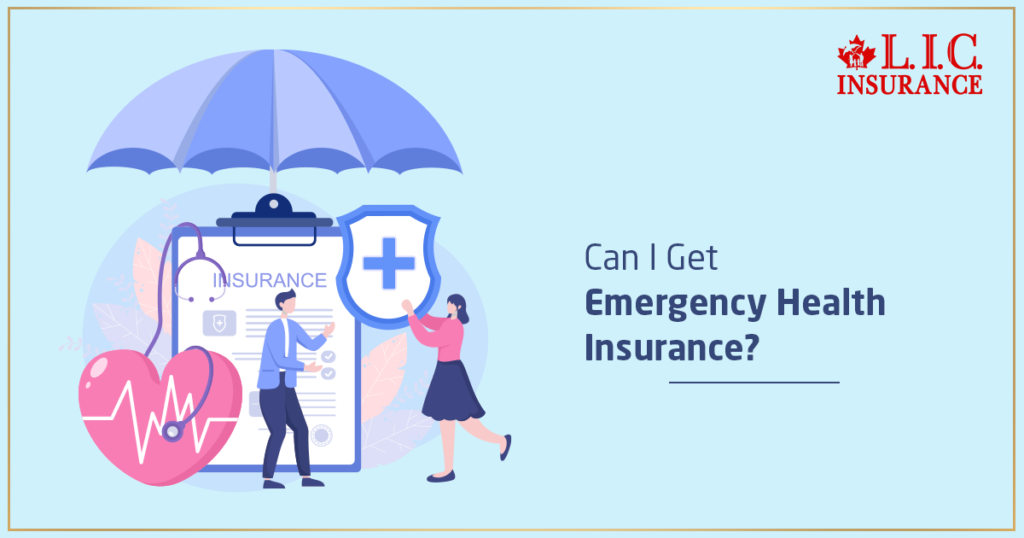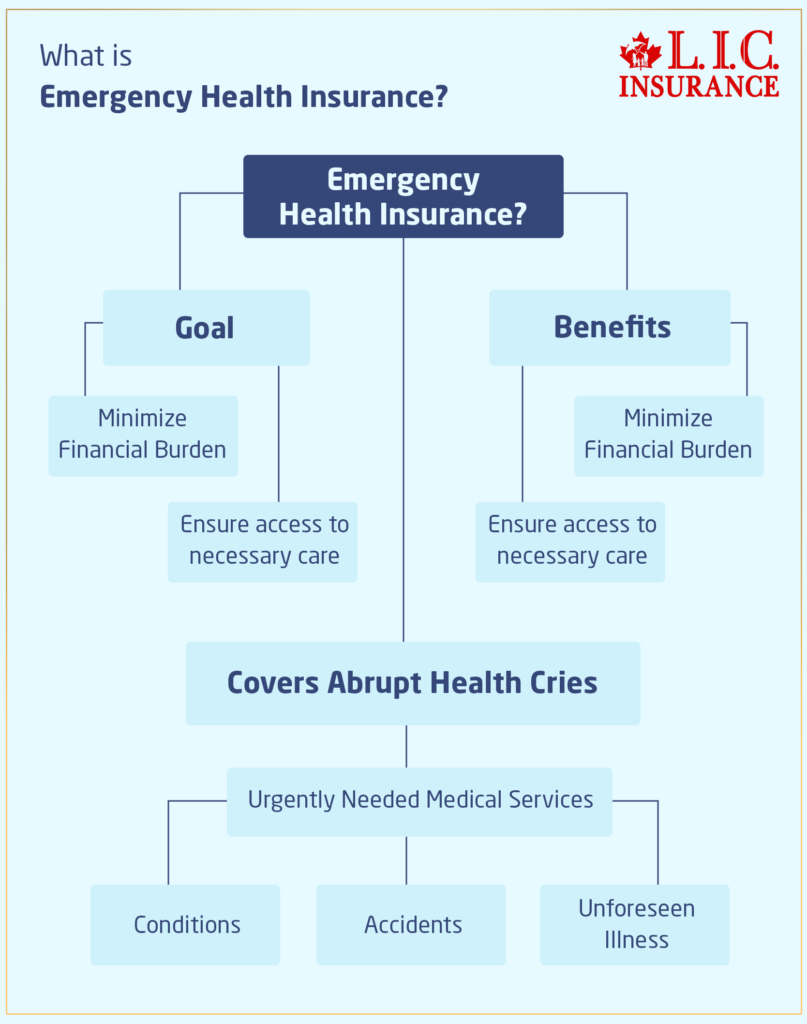
Have you ever found yourself in a situation where unexpected health issues turned your world upside down? Imagine this: You’re preparing for a family dinner, the aroma of your favorite dish fills the air, and suddenly, a sharp pain strikes. Or perhaps you’re on your way to work, thinking about the day ahead when an accident leaves you in dire need of medical attention. In moments like these, the last thing you want to worry about is whether your health insurance covers emergencies. This is where the importance of understanding and securing Emergency Health Insurance Plans becomes undeniable.
Throughout this blog, we will learn all about the world of Emergency Health Insurance in Canada, shedding more light on different plans and coverages. We want to help you figure out insurance and have simple answers to common problems. Well, then, get ready as we unravel the mysteries around Emergency Health Insurance, ensuring you are better placed for the twists and turns of life.
What is Emergency Health Insurance?

This is the health insurance that takes care of an individual during an abrupt health crisis. The insurance does include a host of urgently needed medical services that cannot wait due to the risk to life or permanent impairment. From accidents to unforeseen illnesses, an Emergency Health Insurance Policy assures one is not to be turned away from the necessary care without the added headache of paying for it.
The Real-Life Struggles with Emergency Health Insurance
Most of us have been anxious about dealing with health emergencies. John, for instance, thought everything was all set until he got himself a big bill after an emergency surgery. Meanwhile, Maria visited family in Canada for a holiday when she was taken ill and really needed some medical attention urgently. Unfortunately, it was not clear whether, in this case, her travel insurance would be adequate to meet such an expense. The stress of these everyday stories does point out the importance of clarity and clear-cut answers.
Exploring Emergency Health Insurance Coverage
- Understanding Coverage: First and foremost, appreciate what your current medical insurance covers in times of emergency. Not all policies are equal, and being caught off-guard can be very straining financially.
- Seeking the Right Plan: Those without enough emergency cover must explore the right Emergency Health Insurance Plan that caters to their needs. As a resident, visitor, or student in Canada, there is always a plan for you.
- Real Solutions: Learn how ordinary people solve their insurance problems. John, it has been said, came to learn the hard way that not all emergencies were created equal. With that experience, he went for one of the more costly and all-encompassing Emergency Health Insurance Plans, one with broader coverage that includes surgeries and hospital stays. Some travel insurance is perfect for short visits, so Maria found that she has a wide coverage of emergency health and is insured while staying in the other country.
- Common pitfalls to Avoid: A common mistake is assuming all emergencies are covered without reading the fine print. Another is procrastinating on getting insurance until it's too late. With any change in health and lifestyle requirements, it is also important to renew your insurance with the change in requirements periodically, as coverage requirements should be met without any break.
Engaging with Your Insurance Provider
This makes your direct communications with the insurance provider very handy for sourcing Emergency Health Insurance Plans. In fact, through open and honest conversations, all the nuances related to your Emergency Health Insurance Coverage can only be cleared in the air, and you will also come to know about them. But how do you make it a productive and enlightening conversation? We shall, therefore, now look into the practical steps, a real-life scenario, and guide you so that you get mental peace from understanding.
Start with Specific Questions
The journey begins with asking the right questions that will bring you to the full scope of your Emergency Health Insurance Coverage. These could be questions such as “What does my plan cover?” with brought-up scenarios like “If I were to have an unexpected medical emergency, e.g., a broken leg from an accident, how much will you cover my treatment cost?” This solicitation not only helps get clearer answers but also prepares you for real-life situations.
Scenario-based Discussions
Now, imagine a young career woman like Lisa, who was an adventure enthusiast during her free days. She used to climb rocks during her weekends. At one point in time, troubled by the thought of possible accidents, she called up her insurance company to learn how far the scope of her Emergency Health Insurance extends with respect to a sports injury. Lisa found out that her policy did include ER visits and surgeries; however, it needed a separate rider to be bought that included rescue and repatriation costs through a discussion of certain scenarios. It was necessary for her to update the coverage with all these necessary provisions so that she was fully covered in all her adventures.
Utilize Available Resources
The majority of these insurers offer a variety of resources that give their policyholders a more detailed explanation of their Emergency Health Insurance scope and coverage. These will range from comprehensive FAQs that they have posted on their websites to information brochures and service teams that are geared toward such questions. Also, feel free to request any explanatory material or a link to any online resources that may help you understand the complete coverage details.
Seek Clarifications and Examples
Probe and ask for concrete examples when they relate to your life and lifestyle while talking about your Emergency Health Insurance Coverage. If you are a parent, find out what may be the scenarios for children’s emergency visits. Or, if you have a chronic disease, you would, in fact, know how your emergency coverage works in relation to regular medical care. Real-life examples that your insurer gives can help one imagine how his coverage would work in reality.
Regular Review and Updates
Your health needs and lifestyle can change, and so should your Emergency Health Insurance Coverage. Make it a habit to revisit at least once every year or after any significant change in life—like getting a new job, moving to another city, or changes in family size. Regular check-ins with your insurance provider can ensure your coverage continuously meets your needs.
Building a Two-Way Communication
Remember, engaging your insurer should be a two-way traffic system. You will share your views openly, and at the same time, listen to the solutions given or the ones presented for your input. Seek clarity or simplification if something is not clear. Insurance advisors are there to help, and your clear understanding is their topmost priority.
Empowerment Through Understanding
The more active you become in these discussions with your insurance provider, the more open and better prepared you will be in negotiating your way through Emergency Health Insurance Plans. The insured will have complete mental satisfaction when they are in a position to know the exact details of emergency medical travel insurance, with all the knowledge that the whole family is safe from occurrences in this life that are totally unpredictable.
Always bear in mind that the purpose is not to have an insurance policy but to be sure that it works in your favor when you actually need it. Engage, ask, and verify if that health insurance policy really fits into your realities and aspirations in life.
Taking Action
As one can see from the experiences shared in this blog, waiting until something similar to an emergency in order to understand your insurance coverage can cause lots of stress, confusion, or even financial hardship. It is important that due diligence is taken to ensure that you and your loved ones are fully covered.
- Review your current plan: Understand your insurance policy. Know what is covered, especially for emergencies, and what is not.
- Research and Compare Plans: All of Canada's available plans for health insurance, particularly during emergencies, must be researched. Comparisons shall be drawn on the basis of coverage, emergency medical costs, and customer reviews for the plan that best benefits one.
- Consult with Experts: Consult insurance advisors or even financial planners. Their insights will definitely guide you on how to make the right decisions.
Get The Best Insurance Quote From Canadian L.I.C
Call 1 844-542-4678 to speak to our advisors.

The Bottom Line
Understanding Emergency Health Insurance can be overwhelming, but it’s a journey worth taking. That way, you will be sure of the safety net for you and your family in the most certain points of life. Each of the following stories and solutions presented here illustrates the importance of preparedness and action.
Take your time in an emergency; find out what plans of Emergency Health Insurance are available and at least take the first step in securing yourself. Remember, in health and well-being, being proactive is not just a choice—it’s a necessity.
Get The Best Insurance Quote From Canadian L.I.C
Call 1 844-542-4678 to speak to our advisors.
FAQs on Emergency Medical Coverage
The main purpose of emergency medical coverage is to secure a person from sudden and unexpected medical situations where urgent attention is required. This usually involves an ambulance, room, surgeries, and stays. For example, if one accidentally broke his leg and immediately had to be taken to the hospital, then his Emergency Health Insurance Policy should shoulder the payment for the treatment and stay required.
Prior to travel, you are supposed to check if in the current policy documents your plan includes coverage for emergencies or contact your insurance company. You should, therefore, ask direct questions on specific cases; for example, “Is there first aid for accidents?” This way, you get explicit information that is going to answer your queries.
Standalone emergency medical travel insurance can be purchased as its own policy or as a part of some larger health insurance plan. It would certainly be the best fit with reference to your personal needs and situation. For those travelling or living abroad temporarily, stand-alone emergency plans might be sufficient. However, if you’re seeking comprehensive health coverage, consider a plan that includes both regular medical care and emergency services.
Some pre-existing conditions or elective procedures may be limited and excluded from the Emergency Health Insurance Plan, or there may not be coverage for injuries from high-risk activities. This includes an example where, in the case of highland mountain climbing, one ought to establish if the plan will cater to the emergencies related to the activity. Always read the fine print and ask your provider about any specific concerns you have.
Check whether your emergency medical coverage really covers your health needs. Take a look at your living style, health situation, and possibly relevant risks. Then, have a long talk with your health insurer about what bothers you and under which scenarios. You should review and update your coverage periodically to make sure it most accurately reflects your status in life, and in this case, health. Make sure your plan includes emergency pediatric care if you just had a new baby.
In case of emergencies that you feel are not well taken care of, it is very important that you seek medical help first thing. Immediately after, you can get in touch with your insurer to report the incident and understand your coverage at the earliest opportunity. Keeping receipts and detailed records of the treatment can help in such situations.
In case you disagree with your insurance company’s decision on whether to cover a certain emergency, check your complete coverage details first to learn the basis of your claim. Then, get in touch with your insurance company about the dispute and provide additional information supporting your case. If you have an unresolved question or doubt regarding the detail elaborated above, you can always approach a consumer protection agency or a lawyer who can specialize in insurance dispute resolution.
The coverage with regard to travel under emergency medical travel insurance can vary quite a lot. Some offer worldwide coverage, but many may limit their coverage to within Canada. Should you have travel plans, it’s best to verify with your insurance provider the coverage of your policy overseas. For example, suppose one is going to take a vacation to Europe and, God forbid, any health emergency happens there, of course. In that case, one is interested in determining in advance whether this medical company’s plan will cover their emergency medical treatment expenses or not.
You are supposed to reach out to your insurer as soon as reasonably possible following an emergency. First things come first, and while the health and the immediate concern issues are the priority, the sooner you can inform them, the better processing can go on your claims. Certain plans may have definite time frames within which you must report an incident to receive coverage. For example, if there is a need for surgery from an accident, then the information to the insurance provider within the set period helps to fast-track the claiming process.
Yes, you can always increase your Emergency Health Insurance Plan if you feel that it does not satisfy your needs in full now. Even so, it is encouraged that you take the plan out from time to time in order to inform the insurer about problems and changes in your status. Upgrading your plan might involve additional costs, but it can provide you with peace of mind. For example, suppose you’ve taken up a new sport or activity that increases your risk of injury. In that case, upgrading your coverage to include specific scenarios related to that activity can be beneficial.
Coverage for pre-existing medical conditions varies across Emergency Health Insurance Plans. Some might cover emergencies arising from pre-existing conditions, while others might exclude them from coverage or put them under a waiting period before the coverage is effective. So, this is very crucial to discuss with your insurance provider any information regarding your medical past to know how that is likely to affect your cover. For example, in a situation whereby you have asthma, you can ask whether the same plan would cover an attack that makes you need an emergency.
This is always good if you have proof of your Emergency Medical Insurance, especially if you are travelling. It may be an insurance card, a policy document, or a plan details document in digital form on your phone. The information is useful in the quick delivery of medical services and processing claims if an emergency occurs. For instance, when hospitalization is necessary during the course of travel, the insurance details can ease the clearance of coverage with direct billing.
Deductibles are your out-of-pocket expenses paid before your Emergency Health Insurance kicks in to pay for your covered emergency medical bills. Generally, plans with high deductibles have low premiums and, on the other hand, low plans have high premiums. Understanding how the deduction applies to your plan is critical if you’re going to be budgeting for potential emergencies. For example, if your plan has a deductible of $500, the insured will have to pay the first $500 of his or her emergency medical expenses out of his or her pocket before the insurance takes over to defray the rest.
If you need emergency medical assistance in a remote location, your Emergency Health Insurance Plan may cover medical evacuation to a facility that can provide the necessary treatment. It is important, therefore, to know what your plan covers in such eventualities. Contacting your insurance provider’s emergency assistance hotline can help coordinate the care you need. For example, in the event the policyholder goes mountain hiking into remote areas and gets a serious injury, it is a must to know how to get access to the medical evacuation benefits under that policy.
Sources and Further Reading
For readers looking to dive deeper into the nuances of emergency health insurance plans and coverage, especially within the Canadian context or as applicable internationally, the following sources and further reading materials can be valuable. These resources offer a comprehensive look at health insurance, emergency coverage specifics, and tips for effectively managing and understanding your policy.
- Health Canada: As the federal department responsible for helping Canadians maintain and improve their health, Health Canada provides insights into the healthcare system, including aspects related to insurance coverage. Their website (www.canada.ca/en/health-canada) is a resource for understanding public health policies and services.
- Canadian Life and Health Insurance Association (CLHIA): The CLHIA offers a guide to life and health insurance that includes sections on emergency medical coverage. It's a useful resource for understanding how insurance works in Canada. Visit their website at www.clhia.ca for more information and resources.
- Insurance Bureau of Canada (IBC): The IBC provides information on various types of insurance, including health and travel insurance, which often covers emergency medical situations. Their website (www.ibc.ca) has resources and tips on choosing the right insurance policy and understanding your coverage.
- Travel.gc.ca: For Canadians traveling abroad, this Government of Canada website offers travel advice and safety tips, including information on travel health insurance. This resource is particularly useful for understanding how your health insurance applies outside Canada. Check out their website at www.travel.gc.ca.
- Consumer Reports: Known for providing unbiased product reviews and ratings, Consumer Reports also offers advice on choosing health insurance plans, including emergency coverage. Their articles can help consumers make informed decisions about insurance. Visit www.consumerreports.org for more information.
- The Balance: This financial advice website contains articles on a wide range of insurance topics, including detailed guides on health insurance and emergency medical coverage. Their easy-to-understand guides can help demystify complex insurance terms and policies. Explore more at www.thebalance.com.
- NerdWallet: NerdWallet provides comparisons and guides on financial products, including health insurance. Their resources on how to choose the best health insurance plan for emergency coverage are particularly helpful for consumers looking to understand their options. Find out more at www.nerdwallet.com.
By exploring these sources, readers can gain a deeper understanding of emergency health insurance plans and coverage, empowering them to make informed decisions about their health and financial well-being. Whether you’re a resident in Canada or someone looking for international coverage, these resources offer valuable insights into navigating the complexities of health insurance.
Key Takeaways
- Emergency health insurance protects against unexpected medical expenses.
- Understanding your plan's emergency coverage is essential.
- Communicating with providers clarifies doubts and ensures needs are met.
- Life changes necessitate regular insurance plan reviews and updates.
- Proactivity in managing your health insurance avoids stress during emergencies.
Your Feedback Is Very Important To Us
We’re eager to understand your experiences and challenges with emergency health insurance plans, and how our blog might have helped address those issues. Your feedback is invaluable in helping us provide the most relevant and helpful information. Please take a moment to answer the following questions:
The above information is only meant to be informative. It comes from Canadian LIC’s own opinions, which can change at any time. This material is not meant to be financial or legal advice, and it should not be interpreted as such. If someone decides to act on the information on this page, Canadian LIC is not responsible for what happens. Every attempt is made to provide accurate and up-to-date information on Canadian LIC. Some of the terms, conditions, limitations, exclusions, termination, and other parts of the policies mentioned above may not be included, which may be important to the policy choice. For full details, please refer to the actual policy documents. If there is any disagreement, the language in the actual policy documents will be used. All rights reserved.
Please let us know if there is anything that should be updated, removed, or corrected from this article. Send an email to [email protected] or [email protected]

